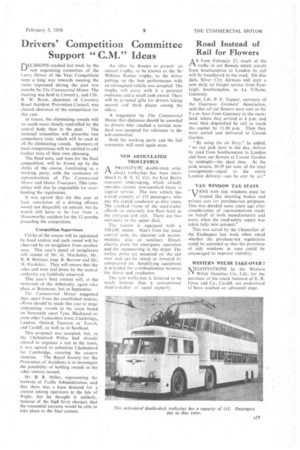Drivers' Competition Committee Support " C.M." Ideas D EC1SIONS reached last
Page 19

If you've noticed an error in this article please click here to report it so we can fix it.
week by the new organizing committee of the Lorry Driver of the Year Competition went a long way towards meeting the views expressed during the past few months by The Conunercial Motor. The meeting was held in Coventry, and Cllr. R. W. Brain, chairman of Coventry Road Accident Prevention Council, was elected chairman of the competition for this year.
En future, the eliminating rounds will be much more closely.controlled by the central body than in the past. The national committee will prescribe two compulsory tests, which will be used in all the eliminating rounds. Sponsors of local competitions will be entitled to add further tests of their own choosing.
The fixed tests, and tests for the final competition, will be drawn up by the clerks of the course, functioning as a working party, with the assistance of representatives of The Commercial Motor and Motor Transport. This committee will also be responsible for overhauling the regulations.
It was agreed that for this year at least, conviction of a driving offence would not disqualify an entrant, but he would still have to be free from a blameworthy accident for the 12 months preceding the competition.
Competition Supervisors Clerks of the course will be appointed by local centres and each round will be observed by an invigilator from another area. This year's panel of invigilators will consist of Mr. G. MacAulay, Mr. R. B. Bettison, Insp. R. Burrow and Mr. M. Hardaker. They will ensure that the rules and tests laid dawn by the central authority are faithfully observed.
This year's final contest will, at the invitation of the Admiralty, again take place at Bramcote, but in September.
The Commercial Motor suggested that, apart from the established centres, efforts should be made this year to stage eliminating rounds in the areas based on Newcastle upon Tyne, BlaCkpool or some other Lancashire town, Cambridge, London, Oxford, Taunton or Yeovil, and Cardiff, as well as in Scotland.
This proposal was accepted, but, as the Chelmsford Police had already offered to organize a test in the town, it was agreed to substitute Chelmsford for Cambridge, covering the eastern counties. The Royal Society for the Prevention of Accidents is to investigate the possibility of holding rounds in the other centres named.
Mr. B. R. Miller, representing the Institute of Traffic Administration, said that there was a keen demand for a contest 'among operators in the Isle of Wight, but he thought it unlikely, because of the high ferry charges, that the successful entrants would be able to take place in the final contest.
An offer by Rootes to present an annual trophy, to be known as the Sir William Rootes trophy, to the driver putting up the best performance with an oil-engined vehicle was accepted. The trophy will carry with it a personal memento and a small cash award. There will be personal gifts for drivers taking second and third places among the oilers.
A suggestion by The Commercial Motor that diplomas should be awarded to drivers who reached a certain standard was accepted for reference to the sub-committee.
Both the working party and the full committee will meet again soon.
NEW ARTICULATED TROLLEYBUS
A PROTOTYPE double-deck artictak ulated trollcybus has been introduced by B. V. G. Ost, the East Berlin transport undertaking, which already operates several non-standard buses in regular service. The new vehicle has a total capacity of 115 passengers, who pay the seated conductor as they enter% The cranked frame of the semi-trailer affords an extremely low floor level at the entrance and exit. There are two staircases to the upper deck.
The tractor is equipped with a 120-kW. motor. Apart from the usual control gear, the spacious cab accommodates also an auxiliary Dieselelectric plant for emergency operation and for rnanceuvring in the depot. The trolley poles are mounted on the cab roof and can be raised or lowered by compressed air. Amplifying equipment is provided for communication between the driver and conductor.
The new trolleybus is believed to be much heavier than a conventional double-decker of equal capacity.




















































